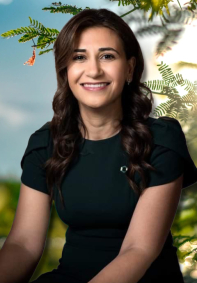Rimeh Daghrir
M.Sc. (2010) and Ph.D. (2013) in water sciences
Applied sciences research advisor, Bureau Recherche-Développement-Valorisation, Université de Montréal
“In addition to rigour and commitment, my journey at INRS has taught me the importance of having a collaborative spirit, not only in research, but in any project. To evolve, succeed and innovate, you have to involve others.”
Rimeh Daghrir sees herself as an ambassador for science and innovation in Quebec and Canada. Above all, it is the human touch that drives her. Her new position as a research advisor in applied sciences at the Université de Montréal combines her expertise and her aspirations: she acts as a liaison between researchers and industrial partners. In her opinion, her training at the Institut national de la recherche scientifique (INRS) has been instrumental in her career path to date.
After obtaining a degree in industrial chemistry engineering from the National Institute of Applied Sciences and Technology (Tunisia) in 2008, Rimeh enrolled in a master’s degree in water sciences at INRS in the laboratory of Professor Patrick Drogui in Quebec City. She continued her research training until she obtained a PhD, also in water sciences, in 2013.
“Having the opportunity to work in a challenging, world-class environment and to work closely with industry and practice settings, while having access to state-of-the-art research infrastructure to advance science is one of the reasons I chose INRS to pursue my graduate studies,” says Rimeh.
Her research focused on the development of a photoelectrocatalytic technology using solar radiation to remove various types of emerging contaminants such as residual drugs detected in water.
To do this, she also worked with the team of Professor My Ali El Khakani—co-director, with Professor Drogui, of her doctoral research—at the Centre Énergie Matériaux Télécommunications in Varennes, whose expertise in advanced catalytic materials proved to be “a great asset” according to Rimeh. The quality of her work was also recognised by the prize for the best doctoral thesis from the Centre Eau Terre Environnement in 2014.
“In addition to rigour and commitment, my journey at INRS has taught me the importance of having a collaborative spirit, not only in research, but in any project. To evolve, succeed and innovate, you have to involve others,” she says. The woman who has worked collaboratively with a number of scientific teams at the Centre Eau Terre Environnement in Quebec City notes that research approaches have evolved considerably and are increasingly relying on interdisciplinarity and intersectorality.
In line with her studies at INRS, Rimeh contributed to the development of environmental electrotechnologies at the Centre des technologies de l’eau, an applied research and technical services centre that is part of the Centres collégiaux de transfert de technologie (CCTT) and attached to the Cégep de Saint-Laurent in Montréal. She was also responsible for the Water Use axis and a member of the scientific committee of CentrEau, the Quebec centre for research on water management. During her different mandates, she contributed to establishing various partnerships with Quebec and Canadian companies.
Rimeh is interested in project management, research administration, and teaching. As such, she completed a joint Executive MBA programme at Université du Québec à Montréal’s École des sciences de la gestion and Université Paris-Dauphine in 2019. Her training and experience bridging the gap between academic research and industry provide her with a sound springboard to fulfill her new role at the Université de Montréal, where she manages projects combining physics, chemistry, biology and artificial intelligence.
In addition to her day job, Rimeh is very active in the scientific community and beyond. In addition to serving on the board of her alma mater, the Institut national de la recherche scientifique (INRS) from 2018 to 2023, she chairs the board of the Caisse Desjardins de Bordeaux-Cartierville-Saint-Laurent and sits on the board of the Natural Sciences and Engineering Research Council of Canada (NSERC) and the Ordre des chimistes du Québec. In short, she is the embodiment of a committed citizen who relies on a solid scientific culture to contribute to Quebec’s technological, economic, and social development.
[As told to the Foundation in February 2023.]

